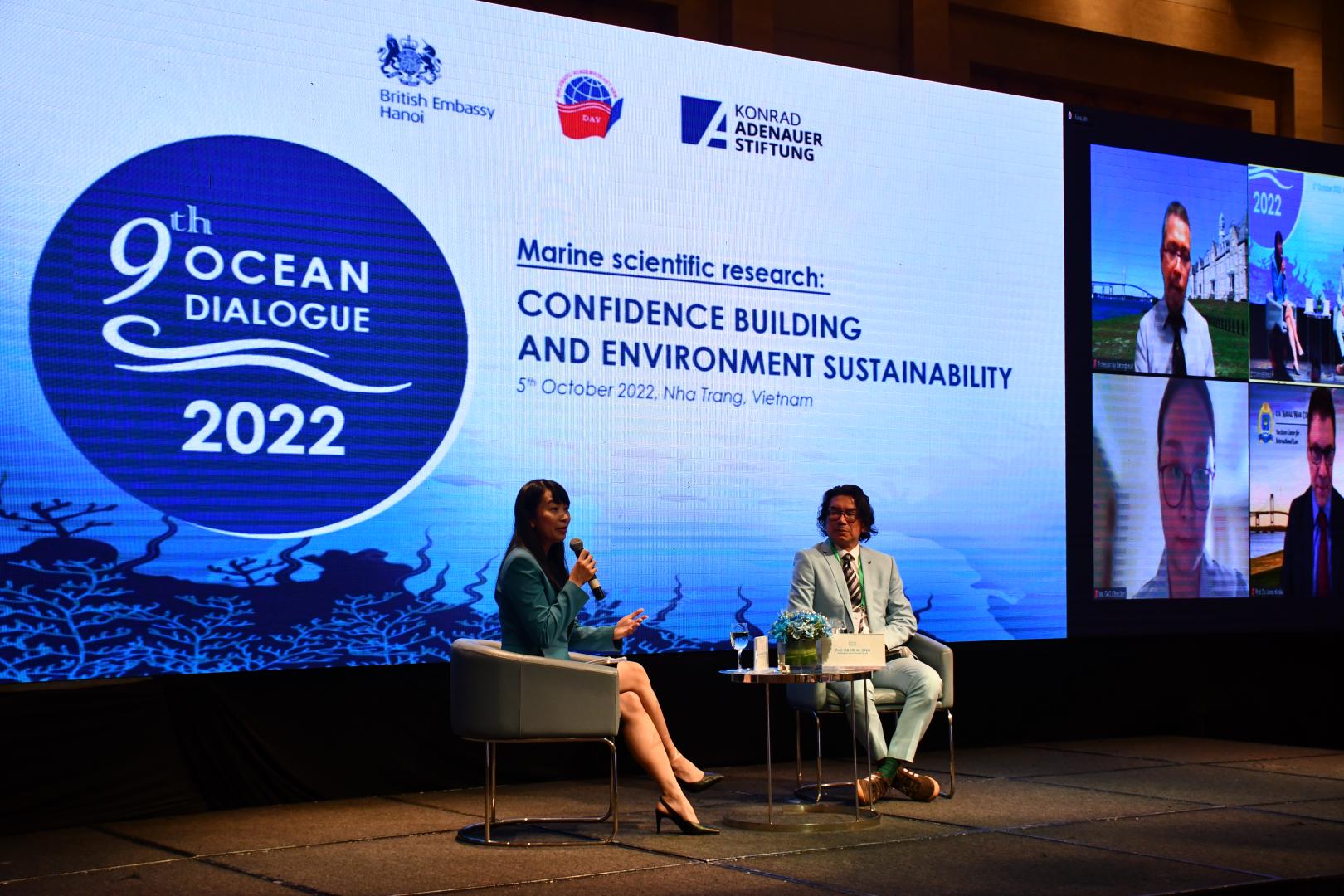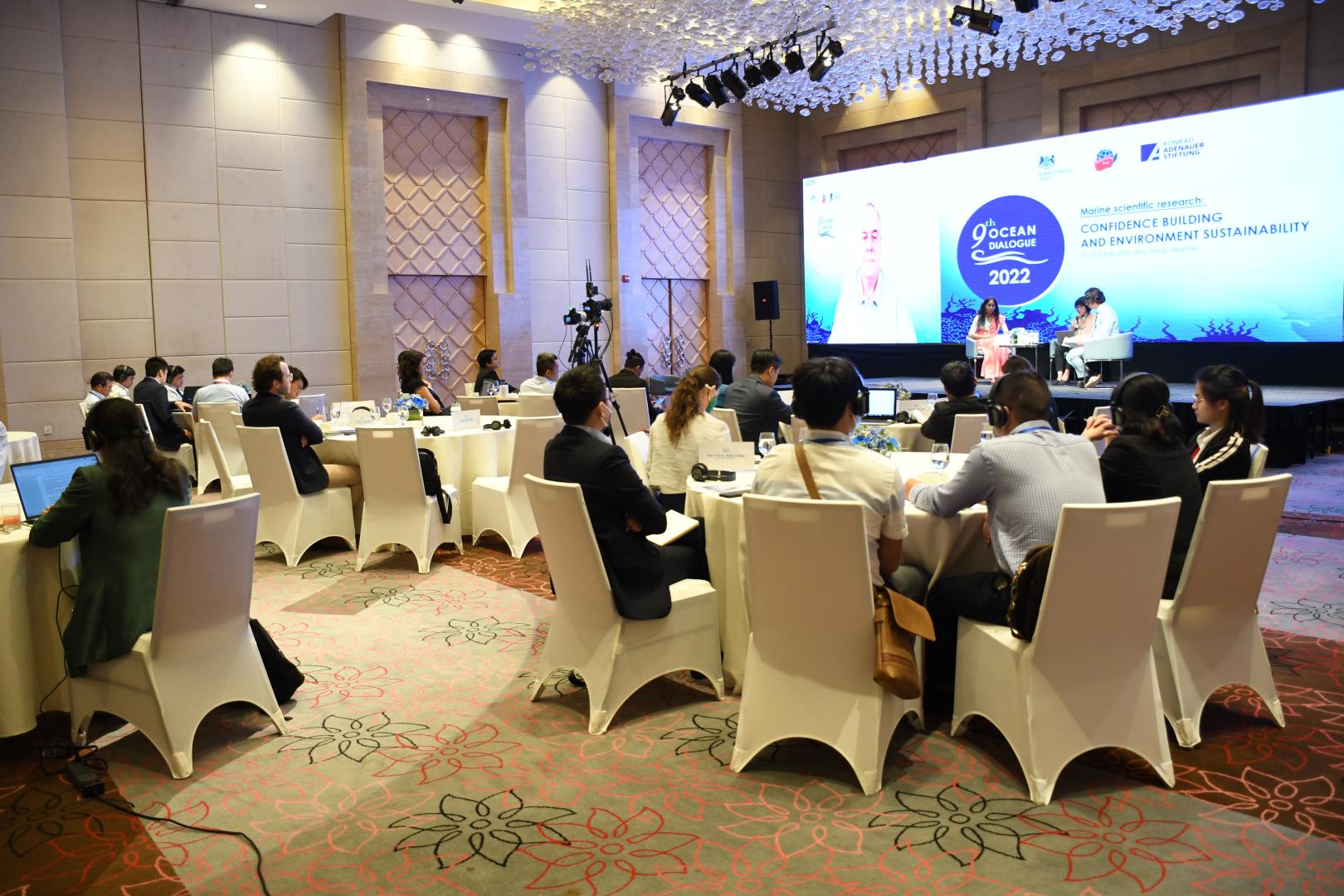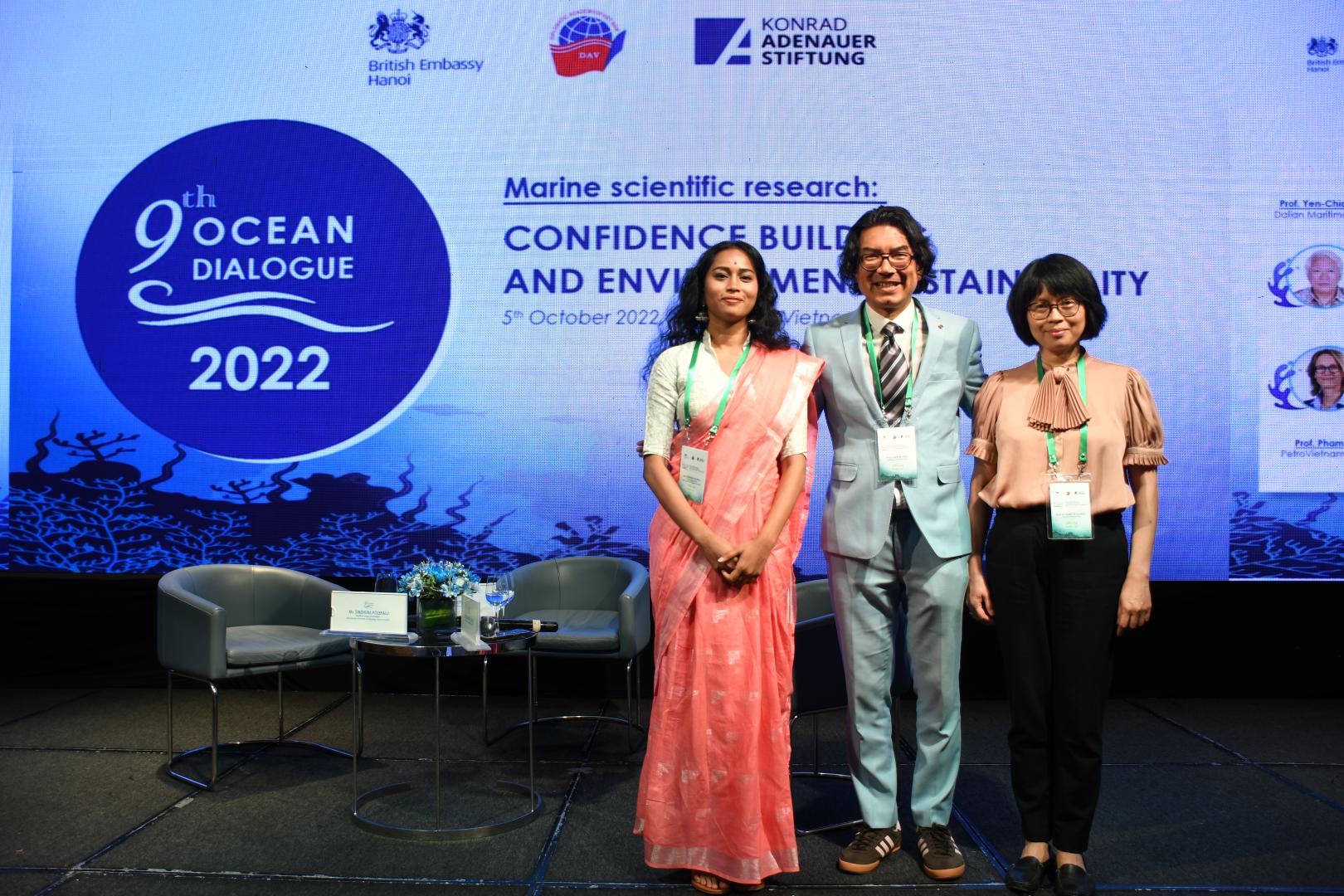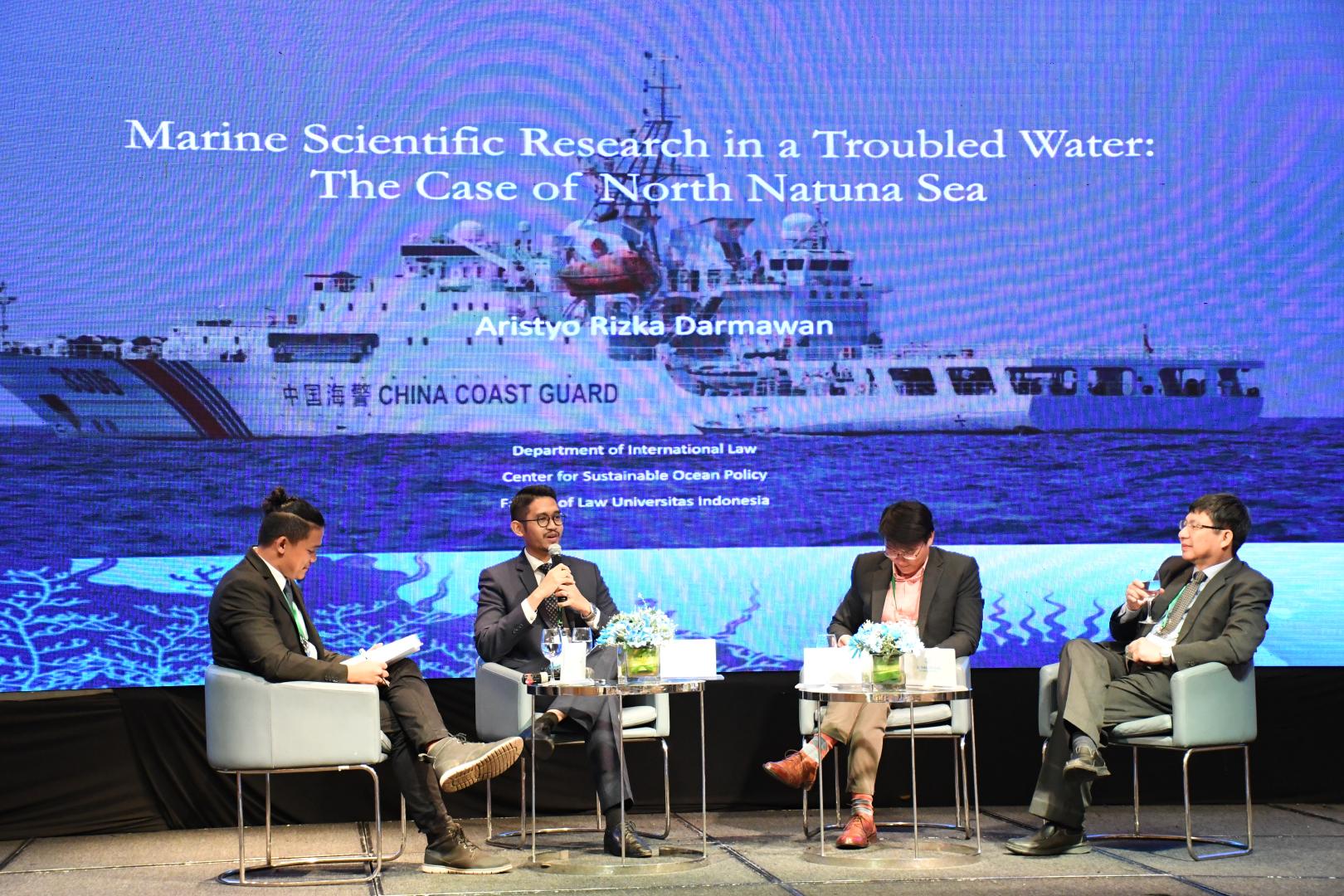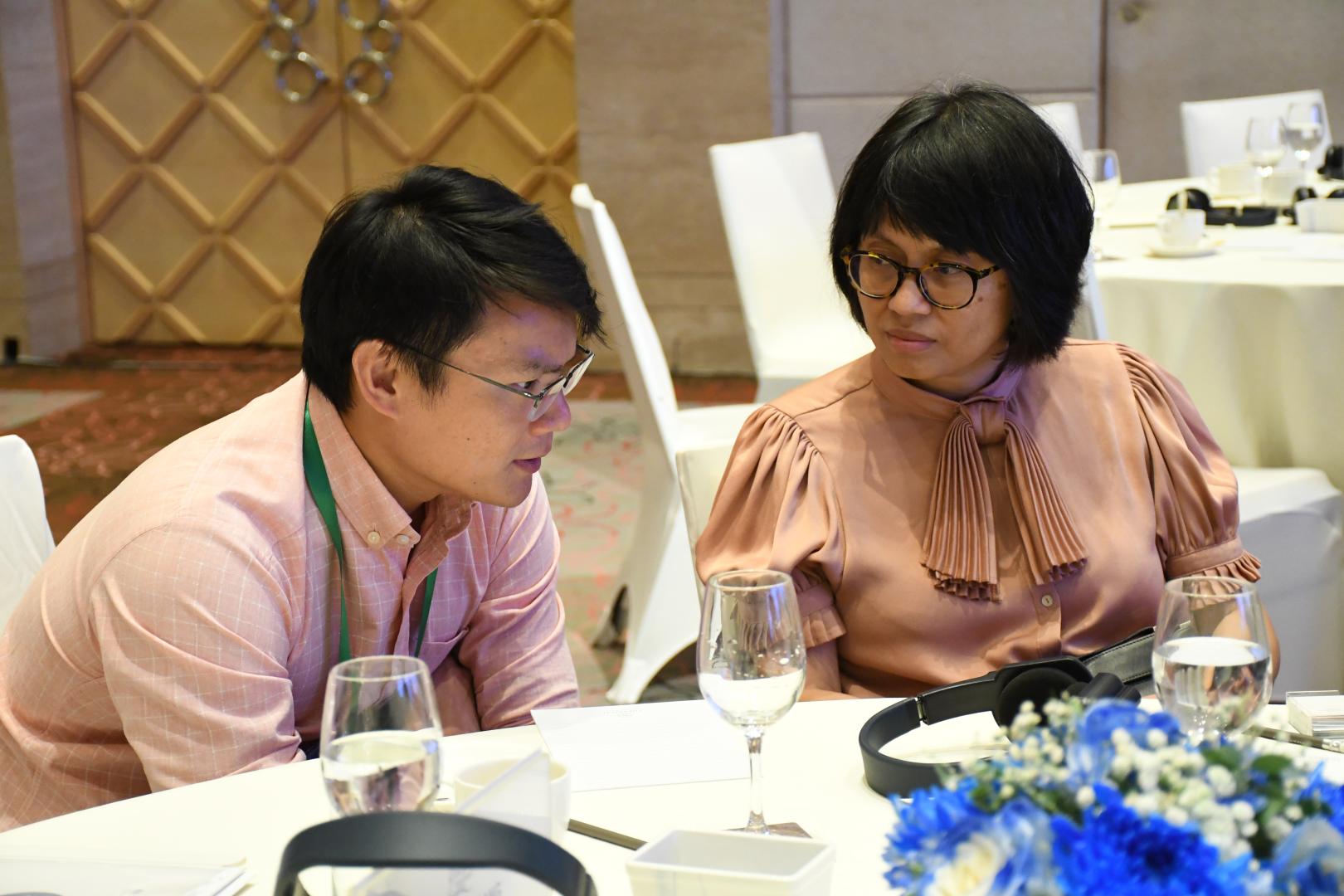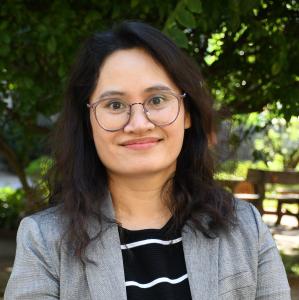In Session 1, four experts shared their in-depth knowledge about the legal framework for marine scientific research under United Nations Convention on the Law of the Sea (UNCLOS). Article 123 of UNCLOS calls for bilateral and multilateral agreements for marine scientific research (MSR). However, states are constantly deploying new marine technologies and in some cases, their potential dual use function indicate new challenges to the interpretation of the current applicable legal regime for MSR under UNCLOS. First, Prof. Dr. David M. Ong, Professor of International and Environmental Law at Nottingham Trent University UK, spoke about marine scientific research in Continental Shelf Beyond 200-nm and Areas beyond National Jurisdiction. He explained that it’s a spatial, definitional and institutional issue. The spatial issues revolve around areas of overlaps because existing provisions don’t develop any suggestions to solve those while the definitional issues involve coastal states sovereignty rights to sedentary species vs. all other states’ rights of access to MSR. The institutional issues are about the relationship between the International Sea-bed Authority and the Biodiversity Beyond National Jurisdiction Agreement (BBNJ). After examining those issues in the context of MSR in the SCS, Prof. Dr. Ong urged to conduct all legal obligations among all member states to allow coordinated research in this regional, semi-enclosed sea for better transparency and accountability. Following his insights, Prof. Dr. James Kraska from the U.S. Naval War College, who participated online, shared some informative definitions delineating that not all marine data collection is considered to be marine scientific research, such as operational oceanography, remote sensing space oceanography, hydrographic surveys, military surveys, prospecting for resources, environmental monitoring and assessment as well as underwater cultural heritage, bio logging and citizen science. Following him, Assoc. Prof. Jay L. Batongbacal from the University of the Philippines explained the difficulty of a lacking precise definition of MSR as well as the difficulty to distinguish between “pure” and “applied” research as common methods are used in both types of research. He mentioned debates over the extent of coastal states’ control over MSC in exclusive economic zones and continental shelfs. To reach a balance to accommodate interests of coastal states and researching states, he suggested to give coastal states the flexibility to decide case-to-case while researching states should provide incentives and comply. Furthermore, he stated the general principles for MSR, being exclusively for peaceful purposes and conducted with appropriate scientific methods and means. He also discussed cases in which coastal states may withhold consent for a foreign state’s conduct of MSR and stated remote sensing via satellite as one of the new challenges. The first session closed with a Q&A session in which interested participants both in person and online made use of the possibility to ask the experts’ opinion about several issues regarding MSR in the South China Sea.
In Session 2, International practices in marine scientific research were discussed with Prof. John McManus from the University of Miami as the first speaker joining online. He started with Giant Clam Chopper Boats at the Paracel and Spratly Islands as an example for massive damage to offshore reefs. He then dwelled on Article 123 of UNCLOS, Cooperation of States bordering Enclosed or Semi-Enclosed Seas, calling bordering nations to coordinate and share research efforts. He stated the need for formal management groups capable of speaking on behalf of their governments. One way to regularize meetings and improve the chances for lasting regional peace would be to establish a South China Sea Regional Fisheries Management Organization (SCS-RFMO) as it would provide a consistent and highly focused forum for research coordination and important management commitments. Following him, Prof. Dr. Suzette Suarez from the Hochschule Bremen in Germany spoke about the establishment of Coral Data featuring spatial data for unilateral scientific research. She mentioned the Intergovernmental Oceanographic Commission (IOC) as the most comprehensive institution and stated that the role of existing institutions cannot be overemphasized. Additionally, she gave the Soviet-American cooperation in Arctic Research as an example of successful cooperation, concluding that states of the South China Sea wouldn’t have any excuse not to cooperate if the two formerly hostile major powers could find common ground in this regard. Bringing the second session to an end, Ms. Sindhura Polepalli, Maritime Legal Consultant at the Directorate General of Shipping, Government of India delivered a speech about India’s vision for marine scientific research in a free and open Indo-Pacific. Since more than half of India’s trade passes through the SCS, India benefits from a strong and stable rules-based order in the region. With climate change becoming an issue of strategic importance, the SCS also acts as a laboratory for understanding the global ocean. Due to India’s transition from an “Look East” to an “Act East” Policy, safeguarding the freedom to conduct MSR in accordance with UNCLOS in the South China Sea is important to India. The session closed with another Q&A session that varied from the challenge of ocean plastic pollution over coral treaty initiatives to existing mechanisms of funding for cooperation in the South China Sea.
In the extensive lunchbreak, participants could enjoy the abundant choice of options for lunch or take a walk on the beautiful beach just in front of the hotel. Recovered and refreshed, the second half of the conference started with Session 3 about regional practices in marine scientific research. Opening the session, Prof. Yen-Chiang Chang from the Dalian Maritime University China started with a definition of MSR and stressed the agreement on enhancing peaceful purposes and the purpose of promoting the interests of all mankind. Dwelling on problems in practice, he suggested that surveying activities should be included in the scope of MSR to reflect the protection of coastal states. Speaking about the legal basis of MSR in the disputed waters of SCS, he stated that coastal states should coordinate scientific research jointly and gave cooperations in MSR between China and Indonesia as a successful example. Following him, Assoc. Prof. Deo Florence L. Onda from the University of the Philippines spoke about the strong ecological connectivity in the South China Sea and the relevance to move towards a long-term scientific cooperation in the region. He mentioned the newly opened Pag-asa Island research station as a site for international cooperation to tackle global challenges like plastic pollution. Consequently, the stage was entered by Prof. Dr. Nguyen Chui Hoi from the Vietnam Fisheries Society to speak about international and regional cooperation on MRS of Vietnam. He shared lessons for the SCS region and mentioned the importance of marine economy to the country’s growth and development. With the establishment of the Institute of Oceanography in Nha Trang in 1922, Vietnam has a long history of cooperation on MSR. Giving a historical overview of international and regional cooperation in the form of bilateral and multilateral agreements, he mentioned projects about a wide range of marine topics with international organizations like IOC WESPAC, UNDP, EU, WWF as well as various oversea countries. The distinguished speaker concluded with the following recommendations: (I) Insensitive issues will be prioritized, (II) Confidence building between stakeholders, (III) The political will from states in the SCS region are required, (IV) Cooperating the tension management to maintain the peaceful environment in the SCS, (V) Establishing a Regional Coordinating Unit on MSR Cooperation in the SCS. Last but not least in this session, Dr. Vu Hai Dang from the National University of Singapore spoke about ASEAN as an important broker for MSR in the SCS. As ASEAN has built an important network of partnerships with its Dialogue Partners in the area of science and technology, the speaker mentioned a number of relating mechanisms and stated five priorities from the action plan on science and technology. His suggestions of measures ASEAN could take to promote cooperation in SCS were: Creating a working group on MSR in SCS, establishing a shared database of scientific research implemented relating to SCS, networking of SCS research institutions, building partnerships with other regional cooperation mechanisms as well as an ARS friendship ship.
The last session of the 9th Ocean Dialogue focused on challenges and policy recommendations for marine scientific research in disputed areas. As the first speaker of this session, Prof. Dr. Nele Matz-Lück from the Kiel University Law School, Germany shared her expertise online. According to her, UNCLOS tries to strike a balance between sovereignty and sovereign rights of the coastal state on the one hand and the promotion of research on the other. Stating that ocean governance and marine environmental protection heavily rely upon the findings of MSR, she stressed its importance. She explained that MSR in disputed areas may lead to serious tensions between states, particularly if it’s relevant to resources or security issues. Furthermore, she stated that bordering states of an enclosed or semi-enclosed sea should create basis for joint research initiatives and described some conditions for collaborative research programs such as transparency, monitoring and the access to and sharing of relevant data. All in all, she strongly argued for the establishment of reliable frameworks for joint scientific research. Following her, Mr. Leon Oei from the Center for Humanitarian Dialogue, Singapore stated that we’re facing an ecological crisis as fish stocks have dropped by 70 – 85 % since the 1950s, claiming that no country can address this threat alone as fish regularly cross international borders. The Common Fisheries Resource Analysis convened government scientists and academics from China, Indonesia, Malaysia, the Philippines and Vietnam to undertake joint analysis of fish stocks, focusing on skipjack tuna. With this undertaking, scientific evidence to improve policies and the development of norms and standards for regional cooperation could be achieved. Next, Dr. Pham Huy Giao from Petro Vietnam University spoke about smart blue education in MSR cooperation in relation with SDG 14: Life under water. After giving some insightful definitions about ocean economy, green economy, blue growth and blue justice, the speaker spoke about the six relevant blue economy sectors. Speaking about the development of blue education, he shared some lessons learned from the Asian Institute of Technology (AIT) and the Coordinating Committee for Geosciences Programs in East and Southeast Asia and stated the importance of smart blue education for sustainable cooperation mechanisms in marine research. As the last speaker, Mr Aristyo Darmawan from Universitas Indonesia shared insights about domestic law enforcement in disputed maritime areas. He explained that MSR in exclusive economic zones requires consent from the coastal state. For disputed areas, concerned states could create provisional agreements that include MSR. Agreements like this would contribute to creating confidence, cooperation and mutual trust between all parties. After another Q&A session that brought up interesting questions about the neutrality and independence of NGOs, Dr. Nguyen Hung Son, Vice President of DAV thanked all distinguished speakers and engaged participants for their fruitful contributions to the 9th Ocean Dialogue which continues to be a successful event for open and constructive dialogue and networking.



